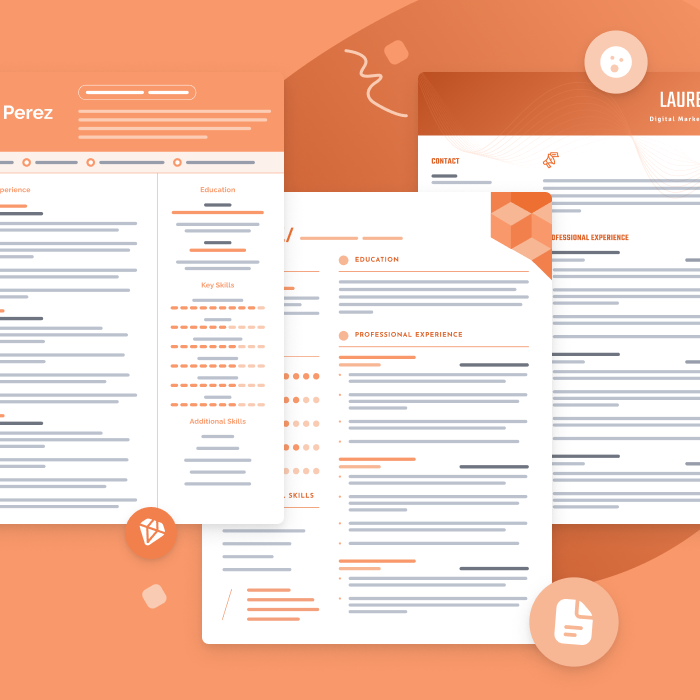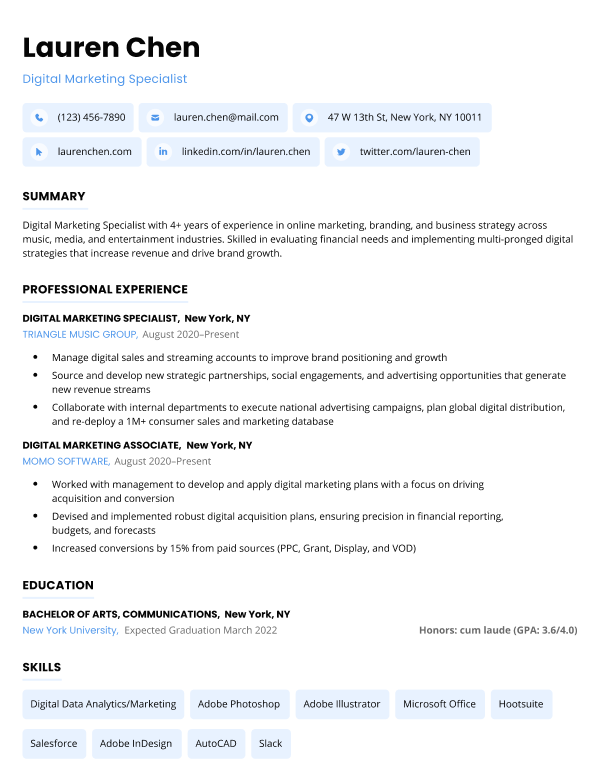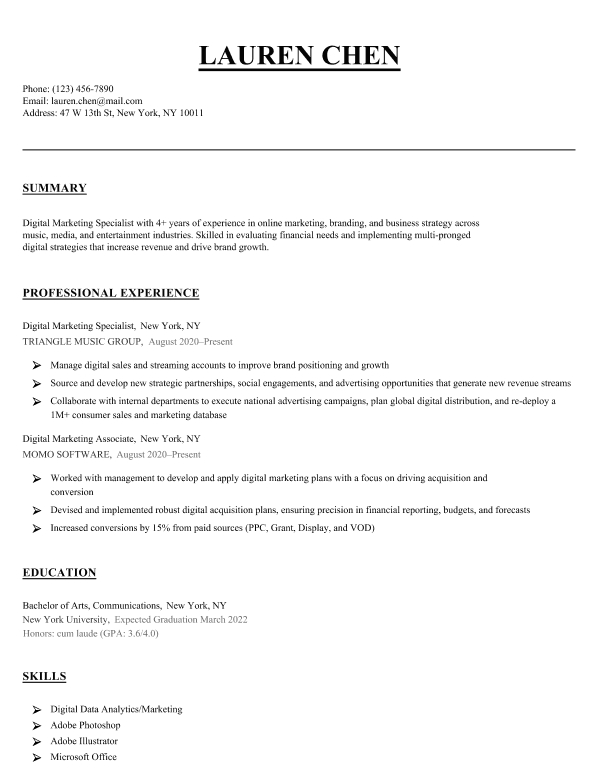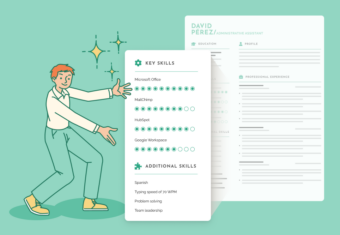What are analytical skills?
Analytical skills refer to the ability to collect information, process it, and draw informed conclusions. Highly sought after by employers, analytical skills enable you to make data-driven decisions and develop creative solutions to problems. Include them when you write your resume and cover letter to convince employers you’ll be an effective employee.
Why are analytical skills important?
The ability to think critically and solve problems is essential in almost any field, which means demonstrating your analysis skills to employers is a great way to increase your marketability and land a job.
Analytical skills help you find trends and patterns, make accurate business predictions, and come up with creative solutions to problems.
When combined with other skills on your resume, your analytical thinking will help you better adapt and respond to challenges like changing market conditions.
Our free-to-use resume builder can make you a resume in as little as 5 minutes. Just pick the template you want, and our software will format everything for you.
6+ analytical skills examples to include on your resume
Here are six examples of key analytical skills to improve and advance your career:
Critical thinking
Critical thinking skills allow you to think clearly and rationally by understanding the logical connection between ideas. It’s a soft skill that involves analyzing all the evidence at your disposal to come to a conclusion.
According to a survey by the American Management Association, 72% of employers feel that critical thinking is an integral part of their company’s success, but only half of the respondents’ employees actually demonstrate this skill.
Data analysis
Data analysis is the ability to collect, organize, and interpret data. Being good at data analysis is essential for a lot of jobs because it helps you develop efficient solutions to problems.
Some examples of data analysis skills include:
- identifying patterns and trends in data
- understanding how different variables might interact
- testing hypotheses through analytical methods
- drawing conclusions from tests
With data driving decisions in nearly every industry, from finance to healthcare to marketing, employers are always looking for candidates who are skilled in data analysis.
The US Bureau of Labor Statistics (BLS) predicts the number of jobs requiring data science skills will increase by about 28% through 2026 with no signs of decline in the near future, making it a great skill to have on your resume well into the future.
Research
Research skills are the abilities needed to find and use new information.
Research skills are valuable because they help in new product development, identifying customer needs and wants, and analyzing market conditions. Not only that, but having strong research skills helps you learn faster and adapt to new situations, making them useful for nearly any position.
Problem solving
Problem solving skills allow you to identify issues and find effective solutions. They’re transferable skills highly sought after by employers looking for employees capable of handling unexpected situations and challenges.
In the workplace, problem solving can take on many forms, whether you’re resolving a conflict with a coworker, dealing with a dissatisfied customer, or solving an invoice-related accounting problem. Being able to assess and resolve problems is a necessary skill that will always be high in demand.
Troubleshooting
While similar to problem solving, troubleshooting is systematic and more technical. It involves identifying the cause of an issue in electronics and software systems and then using a method to identify a problem and identify the cause.
While troubleshooting may sound like a skill reserved for jobs in tech like software engineer or development, it’s useful for any professional using technology on a daily basis. It allows employees to quickly work through tech issues they encounter in the workplace without wasting time or resources.
Forecasting
Forecasting is an analytical skill that involves supporting a company’s growth and stability by predicting its cash flow. To be able to successfully make predictions, you’ll need a solid understanding of business, technical knowledge, and data management skills.
By combining these skills, you can make informed decisions ranging from analyzing market trends to planning mergers or acquisitions.

The best resume templates for 2024
One of the best ways to make your resume is by filling out one of our free resume templates. All our templates are designed by experts and free to download for Microsoft Word or Google Docs.
How to demonstrate your analytical skills
Many employers list analysis skills as a key requirement in job postings, so it’s important to show that you have abilities they’re looking for.
Showcase your analytical skills on your resume
The first place most employers will look in your job application is your resume. That’s why if you want to prove that you have strong analytical skills, it’s essential you include examples on your resume.
The best way to showcase your analysis skills is by listing specific analytical software or tools that you’re familiar with in your resume skills section, like Tableau and Zoho Analytics.
You can also provide examples of analytical methods or processes that you’ve used in previous roles when you list work experience on your resume, like efficiency ratio analysis and data cleaning.
If you don’t have a lot of professional experience, you can still demonstrate your analysis skills by providing examples of times when you’ve used them in your personal life, at school, or during an internship.
The following example shows this financial analyst demonstrating their analytical abilities in their resume summary:
This is a good example because the candidate clearly explains why they’re a good fit for the job and highlights some of their most impressive accomplishments related to their analytical skills.
Show your analytical skills on your cover letter
Your cover letter is the perfect place to provide more in-depth examples of how you used your analytical skills at work.
A good way to demonstrate your analysis skills in your cover letter is by providing an example of a time when you used your analytical skills to solve a problem or make an important decision.
For example, in this business analyst cover letter, the candidate puts forward their analytical expertise:
As a business analyst at TELLCO, I inspect clients’ business requirements and processes through document analysis, interviews, workshops, and workflow analysis. Using my knowledge of SQL, I further support our clients’ systems by conducting 5+ levels of testing including functional, regression, user acceptance, integration, and performance.
During my tenure with TELLCO, I have personally saved clients $500,000 annually in business costs, while also increasing their revenue by 15% through streamlining processes and workflows.
Among my peers, I am regarded as an analytical expert, with great problem solving skills. Furthermore, I have a proven track record of translating stakeholder requirements into tangible deliverables that exceed expectations.
This candidate highlights their analytical skills throughout their cover letter by detailing their responsibilities in their current role, as well as sharing details about their reputation at work.
Demonstrate your analytical skills during an interview
Questions related to analytical ability frequently come up during interviews. Prepare and practice answers to commonly-asked interview questions like the following:
- Can you describe your problem solving process?
- Describe a time when you were given a data-heavy problem. How did you handle the situation?
- How do you go about finding trends in data?
- What is your experience with statistical analysis?
- How comfortable are you working with large data sets?
Be ready to provide specific examples of times you’ve used analysis skills to solve problems. To help you with structuring your answers, you can use the STAR method to craft a professional answer broken down into four parts: situation, task, action, and result.
By preparing convincing answers that display your analysis skills you can quickly show employers that you have the expertise they’re looking for.
How to improve your analytical skills
Not confident in your analytical skills? Here are a few tips to help you develop your analysis skills:
- Practice thinking critically: When you collect and organize information, take a step back and evaluate it.
- Ask questions: This will help you develop a better understanding of the issue at hand and also train your brain to think more analytically and approach problems from different angles.
- Develop your analytical ability outside of a professional setting: Practice your skills outside of work by using brain-training apps and games like Sudoku, crossword puzzles, board games, or chess.
- Conduct research: Stay on top of trends and best practices in your industry. Improving your subject-matter knowledge will lead to faster problem-solving.
- Take on leadership roles: These roles will give you opportunities to put your analysis skills to the test and improve them even further to refine intuitive decision making. For example, you could volunteer to lead a project or take on a leadership role in a community organization.
More skills-related resources for your resume
Here are more skills-related resources for different industries to help you write your resume.
Click to rate this article
4.5 Average rating


















